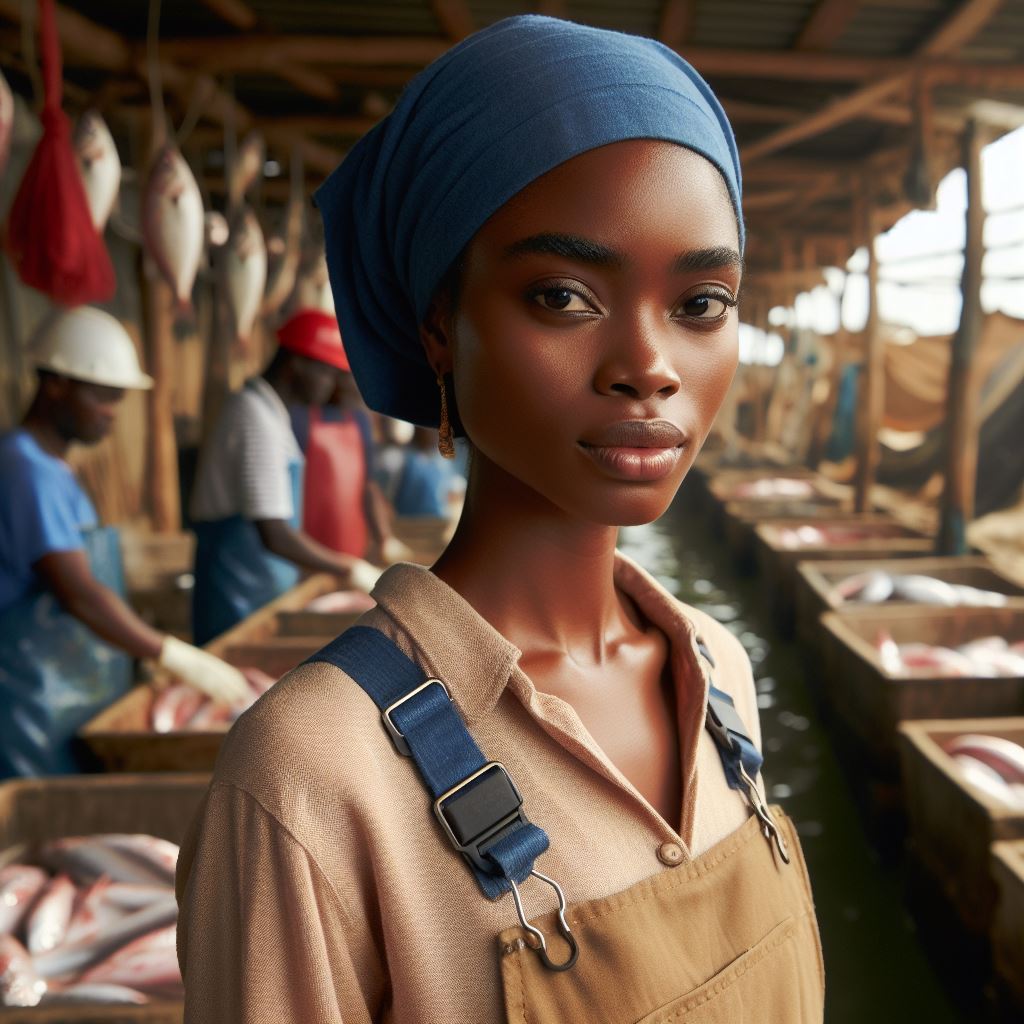Introduction
The emerging trends in Nigerian fisheries research and study play a crucial role in the country’s economic development and food security.
Conducting fisheries research is vital for sustainable fish production, conservation of aquatic resources, and improving livelihoods.
Nigeria is blessed with abundant fishery resources, both inland and marine, making fisheries research and study of utmost importance.
This sector contributes significantly to the country’s GDP, employment, and protein intake for the growing population.
Fisheries research in Nigeria is essential to understand the dynamics of fish population, habitat conditions, and environmental factors affecting their survival.
It helps policymakers in formulating effective regulations and policies for fisheries management and ensuring sustainable utilization of fishery resources.
Research also plays a vital role in identifying and addressing challenges faced by fish farmers and fishermen, such as disease outbreaks, environmental degradation, and climate change impacts.
Moreover, it facilitates the development and promotion of advanced technologies and best practices to enhance fish production, processing, and marketing.
In fact, research and study in Nigerian fisheries field hold significant importance for the sustainable growth of the country’s fisheries sector.
The emerging trends in this field help address the challenges and opportunities faced by the industry.
By investing in research, Nigeria can ensure the conservation of fishery resources, improve livelihoods, and achieve food security for its population.
Historical Perspective of Nigerian Fisheries Research
Fisheries research in Nigeria has evolved significantly over the years, playing a crucial role in the development and growth of the country’s fishing industry.
1. Early Beginnings
Nigeria’s fisheries research dates back to the colonial era when the focus was on exploiting marine resources without a sustainable approach.
2. Establishment of Research Institutions
In the 1950s, the Nigerian Institute for Oceanography and Marine Research (NIOMR) was founded to conduct fisheries research and provide scientific advice to policymakers.
3. Collaboration with International Organizations
Over the years, Nigeria has collaborated with international organizations like the Food and Agriculture Organization (FAO) to enhance its fisheries research capabilities.
4. Implementation of Policies and Legislations
In the 1970s, the government recognized the importance of fisheries and introduced policies and legislations to regulate the industry.
5. Aquaculture Development
Nigerian fisheries research expanded its focus on aquaculture development in the 1980s, promoting sustainable fish farming practices.
6. Enhancement of Fish Stock Assessment
With an increasing demand for fish, Nigeria developed fish stock assessment programs to determine the status and health of fish populations.
7. Research on Post-Harvest Techniques
Efforts were made in the 1990s to improve post-harvest techniques through research, ensuring the quality and preservation of fish products.
8. Development of Fish Processing Technologies
Nigerian researchers also played a significant role in developing fish processing technologies, such as smoking and drying, to extend the shelf life of fish.
9. Addressing Environmental Challenges
In recent years, fisheries research in Nigeria has focused on addressing environmental challenges like pollution and climate change that affect fish populations.
10. Collaboration with Local Communities
To gather local knowledge and engage stakeholders, researchers have increasingly collaborated with fishing communities, ensuring that their perspectives are included in decision-making processes.
11. Contribution to Food Security
Fisheries research in Nigeria has contributed to food security by promoting sustainable fishing practices and increasing fish production.
12. Mitigation of Post-Harvest Losses
Through research, strategies have been developed to reduce post-harvest losses, improving the income and livelihoods of fisherfolk.
13. Policy Recommendations
Researchers have provided policymakers with valuable insights and recommendations for sustainable management of fisheries resources in Nigeria.
14. Capacity Building Initiatives
Efforts have been made to enhance the capacity of Nigerian researchers through training programs and collaborations with international institutions.
15. Promotion of Sustainable Fishing
Nigerian fisheries research has advocated for sustainable fishing practices, including the use of fishing gear and methods that minimize environmental impact.
16. Integration of Technology
Researchers are embracing technology and remote sensing techniques to monitor fish populations and map fishing grounds accurately.
17. Value Chain Development
Fisheries research has played a vital role in developing the fish value chain, improving processing, packaging, and marketing of fish products.
18. Economic Contributions
Through its contributions to the fishing industry, research has stimulated economic growth, generating employment opportunities and income.
19. Stakeholder Engagement
Researchers have actively engaged with stakeholders, including policymakers, fisherfolk, and NGOs, to ensure the effective implementation of research findings.
20. Future Trends
Nigerian fisheries research needs to continue evolving, emphasizing sustainable practices, exploring untapped potentials, and adapting to emerging challenges to fuel the growth of the fishing industry.
In short, Nigerian fisheries research has come a long way, evolving from a focus on exploitation to embracing sustainability.
Throughout its history, research has contributed significantly to the development, management, and growth of the Nigerian fishing industry.
With continued support and investment, fisheries research will play a crucial role in ensuring the sustainable utilization of Nigeria’s aquatic resources.
Read: Fisheries Curriculum: Key Courses to Expect in Nigeria

Current Status of Nigerian Fisheries Research
Overview of Fisheries Research in Nigeria
- The state of fisheries research in Nigeria is currently evolving and gaining recognition.
- There has been an increase in the number of research projects focusing on fisheries.
- Researchers are exploring various aspects of fisheries, including fish species, habitats, and sustainable fishing practices.
- The research is aimed at understanding the dynamics of the fisheries sector and finding solutions to its challenges.
- Studies are conducted at both national and regional levels to provide a comprehensive understanding of Nigerian fisheries.
Major Stakeholders in Fisheries Research
- Government agencies such as the Federal Department of Fisheries play a crucial role in fisheries research.
- These agencies provide funding, resources, and support to researchers and research institutions.
- Research institutions like universities and research centers are actively involved in fisheries research.
- These institutions conduct extensive studies and provide scientific expertise to address various issues in the sector.
- Non-governmental organizations (NGOs) also play a significant role in fisheries research, focusing on sustainable practices.
Challenges and Limitations in Conducting Fisheries Research
- A major challenge faced in fisheries research is the lack of adequate funding and resources.
- Insufficient funding hinders the execution of large-scale research projects and limits the scope of studies.
- There is a shortage of skilled researchers and scientific expertise in the field of fisheries.
- This shortage affects the quality and depth of research conducted in the sector.
- The vast coastal area of Nigeria presents logistical challenges in collecting data and conducting research.
- The lack of reliable and comprehensive data is a limitation in accurately assessing the state of fisheries.
- Climate change and environmental degradation further complicate fisheries research and management.
In essence, Nigerian fisheries research is developing, with an increasing number of studies focusing on different aspects of the sector.
Government agencies, research institutions, and NGOs are major contributors to this research.
However, the field faces significant challenges such as limited funding and resources, a shortage of skilled researchers, and logistical difficulties due to the vast coastal area of Nigeria.
These challenges must be overcome to ensure sustainable management of Nigeria’s fisheries and the conservation of its aquatic resources.
Transform Your Career with Expert Guidance
Get personalized mentorship consulting that’s tailored to your unique path. Our expert advice is actionable and exclusive.
Get StartedRead: Impact of Cultural Practices on Consumer Sciences in Nigeria
Explore Further: Adopting Smart Farming in Nigerian Livestock
Trends in Nigerian Fisheries Research
1. Technological Advancements
The advancements in technology have greatly impacted fisheries research in Nigeria. Satellite imagery, remote sensing, and computer models have become crucial tools in studying fish populations and habitats.
2. Sustainable Fishing Practices
There is an increasing focus on sustainable fishing practices in Nigerian fisheries research. Conserving fish stocks and protecting delicate aquatic ecosystems are now essential aspects of research initiatives.
3. Climate Change and its Impacts
One emerging trend in Nigerian fisheries research is the study of the effects of climate change. Rising temperatures, ocean acidification, and sea-level rise are significantly impacting fish populations and habitats.
4. Integration of Traditional Knowledge
The recognition and inclusion of traditional knowledge in fisheries research is growing. Combining scientific knowledge with indigenous practices leads to more comprehensive studies and better management strategies.
5. Economic Analysis and Market Trends
Another trend in Nigerian fisheries research is the utilization of economic analysis. Understanding market dynamics and trends is crucial for sustainable fisheries management and informed decision-making.
Emerging trends in Nigerian fisheries research demonstrate a shift towards more holistic and sustainable approaches.
By harnessing technological advancements, integrating traditional knowledge, studying climate change impacts, and considering economic analysis, researchers can contribute to the conservation and management of Nigeria’s fisheries resources.
Read: Comparing Nutrition & Dietetics to Consumer Sciences Courses
Implications and Future Directions
As Nigerian fisheries research continues to evolve, it is important to consider the potential implications of these emerging trends.
Adapting research methodologies to address challenges and ensure sustainable fisheries is crucial for the future. Here are some key points to highlight:
Environmental Impact Assessment
Conducting thorough assessments of the environmental impact of fishing practices is essential. This will inform the development of sustainable policies and regulations.
Collaborative Research
Collaborating with stakeholders such as government agencies, local communities, and NGOs will foster a holistic approach to fisheries research. It will allow for the integration of traditional knowledge and promote community engagement.
Technology and Innovation
Embracing modern technology and innovation in fisheries research can greatly enhance data collection, analysis, and monitoring. Remote sensing, satellite imagery, and drones can provide accurate information on fish stocks and habitats.
Climate Change Adaptation
Climate change poses significant challenges to fisheries in Nigeria. Research should focus on understanding the impacts of climate change, developing adaptation strategies, and promoting climate-resilient fishing practices.
Value Chain Analysis
Analyzing the entire value chain of fisheries, from catching to distribution, can help identify inefficiencies, improve market access for fisherfolks, and ensure fair trade practices.
Alternative Livelihoods
As fish stocks decline, exploring alternative livelihoods for fisherfolks is crucial. Research should aim to identify sustainable income-generating activities that complement fishing, such as aquaculture or ecotourism.
Capacity Building
Building the capacity of researchers and fisheries managers is vital. This includes training in research methodologies, data analysis, and policy development. It will ensure the effective implementation of research findings.
Education and Awareness
Promoting awareness of the importance of sustainable fisheries through education and outreach programs can empower local communities to actively participate in conservation efforts.
Promoting Gender Equity
Recognizing the role of women in fisheries and promoting gender equity is essential for sustainable development. Research should address gender-specific challenges and empower women in decision-making processes.
Policy Recommendations
Translating research findings into actionable policy recommendations is crucial. Research should aim to influence policy formulation and provide evidence-based solutions to address fisheries management challenges.
Long-term Monitoring and Evaluation
Implementing long-term monitoring and evaluation programs will help assess the effectiveness of fisheries management strategies. This will facilitate adaptive management and continuous improvement.
In review, the emerging trends in Nigerian fisheries research hold immense potential for addressing the challenges faced by the fisheries sector.
Adapting research methodologies and embracing sustainable practices will ensure the conservation of fish stocks and the livelihoods of fishing communities for future generations.
Read: Career Paths After Studying Nutrition Sciences in Nigeria
Uncover the Details: Importance of Genetics in Livestock Breeding
Conclusion
This blog post discussed the emerging trends in Nigerian fisheries research and study.
We highlighted the importance of conducting ongoing research and study in Nigerian fisheries to ensure sustainable fish stocks and livelihoods.
By staying abreast of new trends and advancements, we can better manage and conserve our fisheries resources.
Continued research will provide valuable insights into the challenges facing Nigerian fisheries and help develop effective strategies to address them.
Ultimately, the sustainable management of fish stocks will not only protect the environment but also support the livelihoods of thousands of people who depend on fisheries for their income.
It is crucial that we prioritize and invest in fisheries research and study to safeguard the future of our fisheries and the communities that depend on them.




